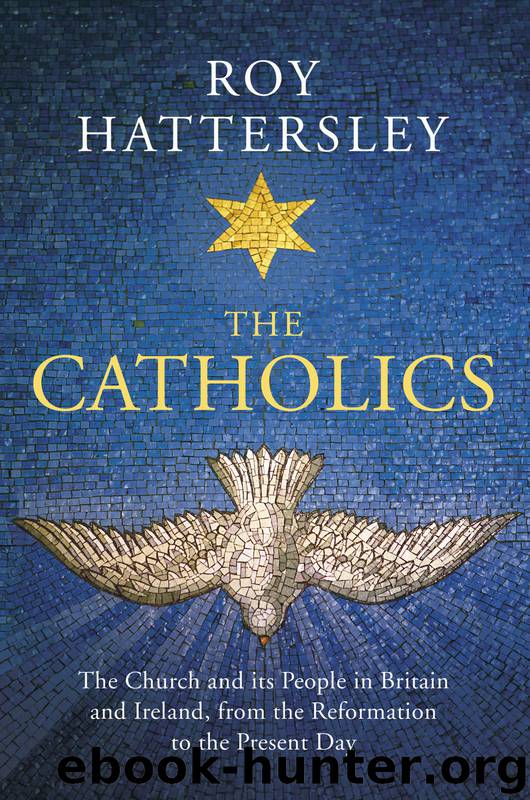The Catholics by Roy Hattersley

Author:Roy Hattersley
Language: eng
Format: epub
ISBN: 9781448182978
Publisher: Random House
CHAPTER 19
The Most Jacobinical Thing
If a Catholic ploughman, homeward plodding his weary way in any part of Britain, felt passionately engaged in the struggle for complete and unqualified emancipation, his emotions were stirred less by resentment at the denial of his own civil rights than by the affront to his Church faith that the denial embodied. The Relief Acts had guaranteed his legal right freely to follow the religion of Rome. Their extension, to include the full rights of citizenship – would be of no immediate benefit to him. He was doubly disenfranchised: first because he was a Catholic, and second because he did not possess the social and financial status that qualified him to vote. Talk of electoral reform rarely went beyond the hope that the franchise could be extended to the property-owning middle classes of the expanding industrial towns. And when that hope was first realised, in the shape of the (extravagantly named) Great Reform Bill of 1832, it only increased the electorate from 435,000 voters to 652,000. Most Catholics – like other working men and women – remained disenfranchised until 1884. In England, at the start of the nineteenth century, emancipation was the active concern of the Catholic nobility and gentry. A recital of the grievances, felt by Catholics at the beginning of the new century, shows how class-related the campaign for full emancipation was.
In July 1804, John Douglass, Vicar Apostolic of the London District, drew up a list of complaints for a rich Catholic laymen, John Brockholes – undeterred by the knowledge that his great-grandfather had died fighting for the Old Pretender at the Battle of Preston – to pass on to the government. It was astonishingly limited to three grievances. Catholic marriages (being outside the law) deprived ‘deserted parties’ from receiving relief and redress. Catholics, serving in the army, were obliged to attend Protestant church parades. Monies, collected for the maintenance of priests, was – if ‘seized upon by malevolent persons’ who claimed it had been intended for ‘superstitious purposes’ – not recoverable by law.1
In his Address to the Protestants of the United Kingdom, Charles Butler of the Catholic Committee composed a more comprehensive list of disabilities. Most of them were penalties which only bore down on the prosperous classes. Catholics were ‘excluded from offices in cities and corporations’ and from ‘civil and military offices’. They were ‘prevented from voting at elections … filling their hereditary seats in Parliament … sitting in the House of Commons’. The disposal of property by gift to the religious foundation of their choice (‘which the law allows even to the Jew’) was prohibited to Catholics. ‘No provision [was] made for the religious comfort and duty of Roman Catholic soldiers and sailors.’ Catholics, who had to ‘support their own religious functionaries’, were also required to ‘contribute to the religious establishment of the country’. Butler added to his list of grievances two complaints that related less to the legal status of Catholics than to the way in which they were treated by their Protestant contemporaries.
Download
This site does not store any files on its server. We only index and link to content provided by other sites. Please contact the content providers to delete copyright contents if any and email us, we'll remove relevant links or contents immediately.
| Africa | Americas |
| Arctic & Antarctica | Asia |
| Australia & Oceania | Europe |
| Middle East | Russia |
| United States | World |
| Ancient Civilizations | Military |
| Historical Study & Educational Resources |
Room 212 by Kate Stewart(5119)
The Crown by Robert Lacey(4814)
Endurance: Shackleton's Incredible Voyage by Alfred Lansing(4781)
The Iron Duke by The Iron Duke(4354)
The Rape of Nanking by Iris Chang(4211)
Joan of Arc by Mary Gordon(4109)
Killing England by Bill O'Reilly(4001)
Say Nothing by Patrick Radden Keefe(3984)
I'll Give You the Sun by Jandy Nelson(3447)
Shadow of Night by Deborah Harkness(3367)
Hitler's Monsters by Eric Kurlander(3342)
Mary, Queen of Scots, and the Murder of Lord Darnley by Alison Weir(3210)
Blood and Sand by Alex Von Tunzelmann(3203)
Eleanor & Park by Rainbow Rowell(3172)
Darkest Hour by Anthony McCarten(3130)
Margaret Thatcher: The Autobiography by Thatcher Margaret(3082)
Book of Life by Deborah Harkness(2938)
Red Famine: Stalin's War on Ukraine by Anne Applebaum(2933)
The One Memory of Flora Banks by Emily Barr(2863)
